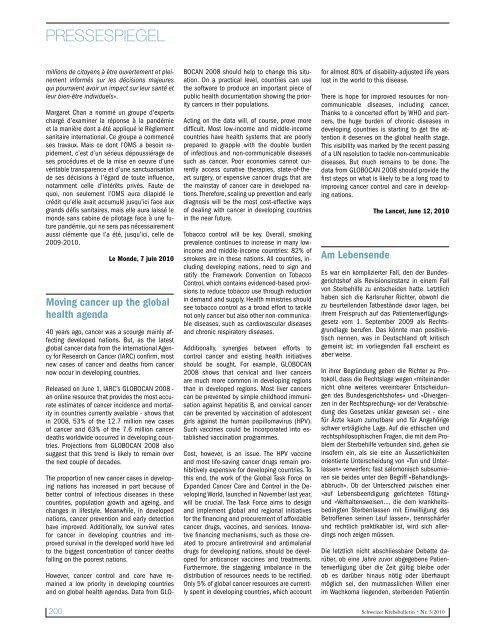Pragmatische Lösung eines komplexen Problems Schweizer ...
Pragmatische Lösung eines komplexen Problems Schweizer ...
Pragmatische Lösung eines komplexen Problems Schweizer ...
Sie wollen auch ein ePaper? Erhöhen Sie die Reichweite Ihrer Titel.
YUMPU macht aus Druck-PDFs automatisch weboptimierte ePaper, die Google liebt.
PRESSESPIEGEL<br />
millions de citoyens à être ouvertement et pleinement<br />
informés sur les décisions majeures<br />
qui pourraient avoir un impact sur leur santé et<br />
leur bien-être individuels».<br />
Margaret Chan a nommé un groupe d’experts<br />
chargé d’examiner la réponse à la pandémie<br />
et la manière dont a été appliqué le Règlement<br />
sanitaire international. Ce groupe a commencé<br />
ses travaux. Mais ce dont l’OMS a besoin rapidement,<br />
c’est d’un sérieux dépoussiérage de<br />
ses procédures et de la mise en oeuvre d’une<br />
véritable transparence et d’une sanctuarisation<br />
de ses décisions à l’égard de toute influence,<br />
notamment celle d’intérêts privés. Faute de<br />
quoi, non seulement l’OMS aura dilapidé le<br />
crédit qu’elle avait accumulé jusqu’ici face aux<br />
grands défis sanitaires, mais elle aura laissé le<br />
monde sans cabine de pilotage face à une future<br />
pandémie, qui ne sera pas nécessairement<br />
aussi clémente que l’a été, jusqu’ici, celle de<br />
2009-2010.<br />
Le Monde, 7 juin 2010<br />
Moving cancer up the global<br />
health agenda<br />
40 years ago, cancer was a scourge mainly affecting<br />
developed nations. But, as the latest<br />
global cancer data from the International Agency<br />
for Research on Cancer (IARC) confirm, most<br />
new cases of cancer and deaths from cancer<br />
now occur in developing countries.<br />
Released on June 1, IARC’s GLOBOCAN 2008 -<br />
an online resource that provides the most accurate<br />
estimates of cancer incidence and mortality<br />
in countries currently available - shows that<br />
in 2008, 53% of the 12.7 million new cases<br />
of cancer and 63% of the 7.6 million cancer<br />
deaths worldwide occurred in developing countries.<br />
Projections from GLOBOCAN 2008 also<br />
suggest that this trend is likely to remain over<br />
the next couple of decades.<br />
The proportion of new cancer cases in developing<br />
nations has increased in part because of<br />
better control of infectious diseases in these<br />
countries, population growth and ageing, and<br />
changes in lifestyle. Meanwhile, in developed<br />
nations, cancer prevention and early detection<br />
have improved. Additionally, low survival rates<br />
for cancer in developing countries and improved<br />
survival in the developed world have led<br />
to the biggest concentration of cancer deaths<br />
falling on the poorest nations.<br />
However, cancer control and care have remained<br />
a low priority in developing countries<br />
and on global health agendas. Data from GLO-<br />
BOCAN 2008 should help to change this situation.<br />
On a practical level, countries can use<br />
the software to produce an important piece of<br />
public health documentation showing the priority<br />
cancers in their populations.<br />
Acting on the data will, of course, prove more<br />
difficult. Most low-income and middle-income<br />
countries have health systems that are poorly<br />
prepared to grapple with the double burden<br />
of infectious and non-communicable diseases<br />
such as cancer. Poor economies cannot currently<br />
access curative therapies, state-of-theart<br />
surgery, or expensive cancer drugs that are<br />
the mainstay of cancer care in developed nations.<br />
Therefore, scaling up prevention and early<br />
diagnosis will be the most cost-effective ways<br />
of dealing with cancer in developing countries<br />
in the near future.<br />
Tobacco control will be key. Overall, smoking<br />
prevalence continues to increase in many lowincome<br />
and middle-income countries: 82% of<br />
smokers are in these nations. All countries, including<br />
developing nations, need to sign and<br />
ratify the Framework Convention on Tobacco<br />
Control, which contains evidenced-based provisions<br />
to reduce tobacco use through reduction<br />
in demand and supply. Health ministries should<br />
see tobacco control as a broad effort to tackle<br />
not only cancer but also other non-communicable<br />
diseases, such as cardiovascular diseases<br />
and chronic respiratory diseases.<br />
Additionally, synergies between efforts to<br />
control cancer and existing health initiatives<br />
should be sought. For example, GLOBOCAN<br />
2008 shows that cervical and liver cancers<br />
are much more common in developing regions<br />
than in developed regions. Most liver cancers<br />
can be prevented by simple childhood immunisation<br />
against hepatitis B, and cervical cancer<br />
can be prevented by vaccination of adolescent<br />
girls against the human papillomavirus (HPV).<br />
Such vaccines could be incorporated into established<br />
vaccination programmes.<br />
Cost, however, is an issue. The HPV vaccine<br />
and most life-saving cancer drugs remain prohibitively<br />
expensive for developing countries. To<br />
this end, the work of the Global Task Force on<br />
Expanded Cancer Care and Control in the Developing<br />
World, launched in November last year,<br />
will be crucial. The Task Force aims to design<br />
and implement global and regional initiatives<br />
for the financing and procurement of affordable<br />
cancer drugs, vaccines, and services. Innovative<br />
financing mechanisms, such as those created<br />
to procure antiretroviral and antimalarial<br />
drugs for developing nations, should be developed<br />
for anticancer vaccines and treatments.<br />
Furthermore, the staggering imbalance in the<br />
distribution of resources needs to be rectified.<br />
Only 5% of global cancer resources are currently<br />
spent in developing countries, which account<br />
for almost 80% of disability-adjusted life years<br />
lost in the world to this disease.<br />
There is hope for improved resources for noncommunicable<br />
diseases, including cancer.<br />
Thanks to a concerted effort by WHO and partners,<br />
the huge burden of chronic diseases in<br />
developing countries is starting to get the attention<br />
it deserves on the global health stage.<br />
This visibility was marked by the recent passing<br />
of a UN resolution to tackle non-communicable<br />
diseases. But much remains to be done. The<br />
data from GLOBOCAN 2008 should provide the<br />
first steps on what is likely to be a long road to<br />
improving cancer control and care in developing<br />
nations.<br />
Am Lebensende<br />
The Lancet, June 12, 2010<br />
Es war ein komplizierter Fall, den der Bundesgerichtshof<br />
als Revisionsinstanz in einem Fall<br />
von Sterbehilfe zu entscheiden hatte. Letztlich<br />
haben sich die Karlsruher Richter, obwohl die<br />
zu beurteilenden Tatbestände davor lagen, bei<br />
ihrem Freispruch auf das Patientenverfügungsgesetz<br />
vom 1. September 2009 als Rechtsgrundlage<br />
berufen. Das könnte man positivistisch<br />
nennen, was in Deutschland oft kritisch<br />
gemeint ist; im vorliegenden Fall erscheint es<br />
aber weise.<br />
In ihrer Begründung geben die Richter zu Protokoll,<br />
dass die Rechtslage wegen «miteinander<br />
nicht ohne weiteres vereinbarer Entscheidungen<br />
des Bundesgerichtshofes» und «Divergenzen<br />
in der Rechtsprechung» vor der Verabschiedung<br />
des Gesetzes unklar gewesen sei - eine<br />
für Ärzte kaum zumutbare und für Angehörige<br />
schwer erträgliche Lage. Auf die ethischen und<br />
rechtsphilosophischen Fragen, die mit dem Problem<br />
der Sterbehilfe verbunden sind, gehen sie<br />
insofern ein, als sie eine an Äusserlichkeiten<br />
orientierte Unterscheidung von «Tun und Unterlassen»<br />
verwerfen; fast salomonisch subsumieren<br />
sie beides unter den Begriff «Behandlungsabbruch».<br />
Ob der Unterschied zwischen einer<br />
«auf Lebensbeendigung gerichteten Tötung»<br />
und «Verhaltensweisen…, die dem krankheitsbedingten<br />
Sterbenlassen mit Einwilligung des<br />
Betroffenen seinen Lauf lassen», trennschärfer<br />
und rechtlich praktikabler ist, wird sich allerdings<br />
noch zeigen müssen.<br />
Die letztlich nicht abschliessbare Debatte darüber,<br />
ob eine Jahre zuvor abgegebene Patientenverfügung<br />
über die Zeit gültig bleibe oder<br />
ob es darüber hinaus nötig oder überhaupt<br />
möglich sei, den mutmasslichen Willen einer<br />
im Wachkoma liegenden, sterbenden Patientin<br />
200 <strong>Schweizer</strong> Krebsbulletin • Nr. 3/2010



